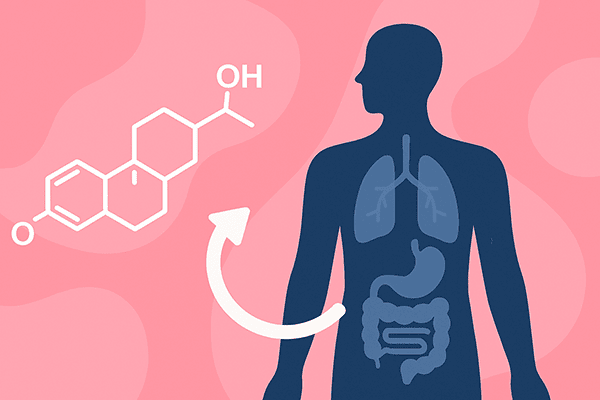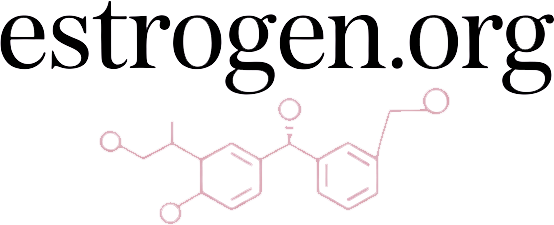Estrogen inMen
Yes, men produce estrogen — and it matters more than you think.

Do Men Have Estrogen?
While testosterone is the dominant male sex hormone, men also produce estrogen — and it plays critical roles in their health. This isn't a sign of any "feminization" but rather a normal and necessary part of male physiology.
Estradiol (E2)
The primary form of estrogen found in men. Even though levels are lower than in women, estradiol plays essential roles in male health and development.
Aromatization
In men, estrogen is primarily produced through a process called aromatization, where testosterone is converted to estradiol by the enzyme aromatase.
Did you know?
Healthy adult men generally have higher estrogen levels than postmenopausal women. This illustrates that estrogen is not exclusively a "female hormone" but rather an essential component of hormone balance across all genders.
What Does Estrogen Do in Men?
Beyond its reproductive roles, estrogen impacts multiple body systems in men. Here are some of the key functions:
Brain & Mood
Supports cognitive function, memory formation, and emotional regulation. Helps protect against age-related cognitive decline.
Bone Health
Essential for maintaining bone mineral density and preventing osteoporosis in men. Estrogen deficiency is a major risk factor for bone loss.
Sexual Function
Contributes to healthy libido, erectile function, and sperm maturation. Balanced estrogen levels are necessary for optimal sexual health.
Heart Health
Provides cardiovascular protection through effects on blood vessels, cholesterol metabolism, and inflammatory responses.
Metabolism & Fat Distribution
Influences body composition, fat storage patterns, and insulin sensitivity. Helps regulate energy balance.
Estrogen Imbalance in Men
Both too little and too much estrogen can cause health problems for men. Recognizing the signs of imbalance is the first step toward treatment.
Signs of Low Estrogen
- Fatigue and low energy
- Decreased libido (sex drive)
- Erectile dysfunction
- Bone loss and increased fracture risk
- Mood swings or depression
- Brain fog and concentration issues
Signs of High Estrogen
- Gynecomastia (breast tissue growth)
- Weight gain, especially around hips/abdomen
- Water retention and bloating
- Increased emotional sensitivity
- Low testosterone symptoms
- Reduced muscle mass and strength
Note: Many of these symptoms can have other causes besides estrogen imbalance. Always consult with a healthcare provider for proper diagnosis.
Causes of Estrogen Imbalance
Age-related hormonal shifts
As men age, testosterone levels typically decrease while estrogen levels may remain stable or increase relatively, changing the hormone balance.
Obesity
Fat tissue contains aromatase, the enzyme that converts testosterone to estrogen. Excess body fat can lead to increased estrogen production.
Liver dysfunction
The liver helps metabolize and clear estrogen from the body. Liver problems can lead to estrogen buildup.
Medications & supplements
Certain medications, anabolic steroids, and some supplements can affect estrogen levels or activity in men.
Endocrine disorders
Conditions affecting the pituitary gland, thyroid, or adrenal glands can disrupt normal estrogen regulation.
!Environmental factors
Exposure to xenoestrogens (environmental compounds that mimic estrogen) through plastics, pesticides, personal care products, and industrial chemicals may also affect hormone balance in men. These compounds can bind to estrogen receptors and potentially disrupt normal hormonal function.
Testing & Treatment
How is Estrogen Tested in Men?
Blood Testing
A comprehensive hormone panel can measure estradiol (E2) levels, along with testosterone (total and free), SHBG, and other related hormones.
Symptom Assessment
Doctors will evaluate symptoms alongside blood test results to determine if an estrogen imbalance is the likely cause of health issues.
Treatment Approaches
- For Low Estrogen: In some cases, controlled estrogen supplementation may be prescribed.
- For High Estrogen: Aromatase inhibitors or selective estrogen receptor modulators (SERMs) may be used under medical supervision.
- Lifestyle Modifications: Weight management, dietary changes, exercise, and reducing alcohol consumption can help balance hormones naturally.
"Estrogen doesn't make men less masculine — in fact, it helps maintain health, balance, and function."
Frequently Asked Questions
Get our free guide: Estrogen 101
A Quick Start to Understanding Hormones – the essential information you need, delivered straight to your inbox.
